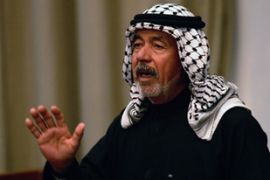‘Chemical Ali’ execution approved
Iraq’s presidency council permits hanging of Saddam’s cousin on genocide charges.

| Related link |
The presidency council, which comprises Jalal Talabani, Iraq’s president, and his two deputies, Tareq al-Hashemi and Adel Abdul-Mahdi, had said that it had the exclusive authority to sanction the executions.
Sultan Hashim al-Tai, a former defence minister under Saddam, and Hussein Rashid al-Tikriti, deputy chief of operations in the armed forces, were also sentenced to death during the Anfal trial.
A council source said no decision had been made on whether to execute those individuals.
Al-Hashemi has said he does not believe army officers should be punished for following orders.
Sustained attacks
It is estimated that 182,000 Kurds were killed in gas and bomb attacks during the Anfal campaign, while 4,000 villages were destroyed.
Throughout his trial, al-Majid was unrepentant about ordering the attacks.
“I am the one who gave orders to the army to demolish villages and relocate the villagers … I am not defending myself. I am not apologising. I did not make a mistake,” he said.
Human Rights Watch, a New York based rights organisation, questioned whether the defendants in the Anfal trial had received a fair hearing.
Al-Majid was also accused of overseeing the gassing of 5,000 Kurds in the town of Halabja, although this was not part of the Anfal operation.
